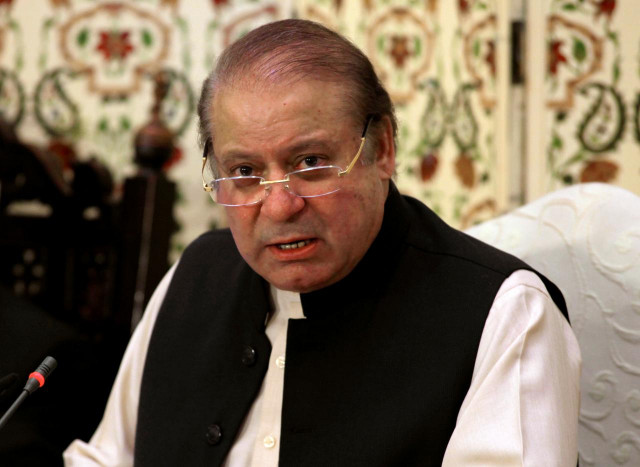Sharif defends suspension of conviction in Avenfield case
Says verdicts does not enter into the ‘realm of deeper appreciation of evidence’

Deposed Prime Minister Nawaz Sharif.
PHOTO: FILE
Sharif, through his counsel Khawaja Haris, submitted to the Supreme Court a reply to the National Accountability Bureau (NAB) appeal against the IHC verdict that resulted in the release of the former PM, his daughter Maryam Nawaz and son-in-law Capt (retd) Muhammad Safdar from Rawalpindi’s Adiala Jail. The apex court will resume hearing of the case tomorrow (Monday) and is expected to conclude the proceedings the same day.
According to the PM’s reply, where a convict is being held in custody pursuant to a judgment which prima facie suffers from a glaring legal defect, the continuing incarceration of such a convict would ipso facto constitute a case of hardship.
Sharif family members submit reply defending IHC verdict
“[In that case] he would be unjustly bereft of his right to life, liberty, dignity, and freedom of movement as guaranteed by Articles 9, 14, and 15 of the Constitution, besides being so held in custody in breach of the rule of due process as mandated by Article 4 of the Constitution,” it says.
It adds that in such a case there would be no recompense for him for the period spent in jail in case he is ultimately acquitted. While because of the provisions of Section 426(3) CrPC, no loss to the state would ensue in case he is released on bail pending appeal.
The reply says that despite complete ouster by subordinate law, superior courts always have jurisdiction to grant bail under Article 199 of the Constitution. Principles applicable for grant of bail, while exercising powers under Article 199 of the Constitution, would be the same as under Section 497 CrPC.
In cases under the National Accountability Ordinance 1999, the reply says, the ‘rule of hardship was never applied by the Supreme Court except in the two unreported cases relied upon by the prosecution.
Defending the IHC judgment, the reply says the verdict is spread over 41 pages, the first 32 pages of which merely reproduce the arguments submitted on behalf of the receptive parties and discusses the case law relating to, inter alia, per-condition for grant of suspension of sentence and release on bail.
‘Time not right for Nawaz, Maryam to break silence’
“The actual reasons for suspension of sentence and grant of bail are discussed in the following 12 pages of which 6 pages (paras 23-26) relate to the respondent (Nawaz Sharif), 3 pages (paras 27 & 28) relate to respondent’s co-convicts, while the last 2 pages consider the implication of observations made in the judgment rendered in Imran Ahmad Khan Niazi’s case (PLD 2017 SC 265).
“[It] ends by reproducing the short order passed in the case. Hence, it is submitted with respect that the judgment does not in any manner enter into the realm of deeper appreciation of evidence,” it says.
Explaining ‘defect’ in the accountability court verdict, the reply says the trial court too is completely silent as to quantification of Sharif’s pecuniary resources at the time of alleged purchase of the assets, as well as quantification in terms of value of the assets at the time of alleged purchase.
“In the accountability court’s judgment neither any finding was given, nor any reference was made, as to what was the value or purchase price of the property known as Avenfield properties in the year 1993-1995 and 1996.”
According to the reply, the bare reading of the judgment shows that there was no evidence referred to prima facie support or justify a finding that the value of the ‘assets’ alleged to have been acquired by the respondent in the year 1993-1995 & 1996 were disproportionate to his sources of income.
The Sharif’s reply, while referring the SC judgments, says where an incriminating piece of evidence forming basis of conviction of accused is not put to him under Section 342 CrPC, the said piece of evidence cannot be used against him to convict him.



















COMMENTS
Comments are moderated and generally will be posted if they are on-topic and not abusive.
For more information, please see our Comments FAQ